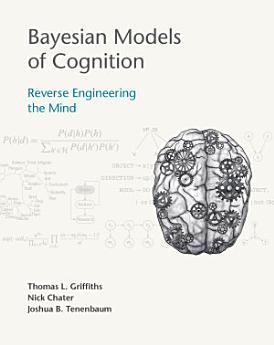Bayesian Models of Cognition: Reverse Engineering the Mind
Nov 2024 · MIT Press
Ebook
648
Pages
family_home
Eligible
info
reportRatings and reviews aren’t verified Learn More
About this ebook
The definitive introduction to Bayesian cognitive science, written by pioneers of the field.
How does human intelligence work, in engineering terms? How do our minds get so much from so little? Bayesian models of cognition provide a powerful framework for answering these questions by reverse-engineering the mind. This textbook offers an authoritative introduction to Bayesian cognitive science and a unifying theoretical perspective on how the mind works. Part I provides an introduction to the key mathematical ideas and illustrations with examples from the psychological literature, including detailed derivations of specific models and references that can be used to learn more about the underlying principles. Part II details more advanced topics and their applications before engaging with critiques of the reverse-engineering approach. Written by experts at the forefront of new research, this comprehensive text brings the fields of cognitive science and artificial intelligence back together and establishes a firmly grounded mathematical and computational foundation for the understanding of human intelligence.
How does human intelligence work, in engineering terms? How do our minds get so much from so little? Bayesian models of cognition provide a powerful framework for answering these questions by reverse-engineering the mind. This textbook offers an authoritative introduction to Bayesian cognitive science and a unifying theoretical perspective on how the mind works. Part I provides an introduction to the key mathematical ideas and illustrations with examples from the psychological literature, including detailed derivations of specific models and references that can be used to learn more about the underlying principles. Part II details more advanced topics and their applications before engaging with critiques of the reverse-engineering approach. Written by experts at the forefront of new research, this comprehensive text brings the fields of cognitive science and artificial intelligence back together and establishes a firmly grounded mathematical and computational foundation for the understanding of human intelligence.
- The only textbook comprehensively introducing the Bayesian approach to cognition
- Written by pioneers in the field
- Offers cutting-edge coverage of Bayesian cognitive science's research frontiers
- Suitable for advanced undergraduate and graduate students and researchers across the sciences with an interest in the mind, brain, and intelligence
- Features short tutorials and case studies of specific Bayesian models
About the author
Thomas L. Griffiths is Henry R. Luce Professor of Information Technology, Consciousness and Culture in the Departments of Psychology and Computer Science at Princeton University and coauthor of Algorithms to Live By: The Computer Science of Human Decisions. His research, which has received awards from the American Psychological Association and the National Academy of Sciences, among other organizations, explores connections between human and machine learning, using ideas from statistics and artificial intelligence to understand how people solve the challenging computational problems they encounter in everyday life.
Nick Chater is Professor of Behavioural Science at Warwick Business School and author of The Mind Is Flat: The Remarkable Shallowness of the Improvising Brain, among many other books. He studies the cognitive and social foundations of rationality and language and is the recipient of four national awards for psychological research and, in 2023, the Cognitive Science Society’s David E. Rumelhart Prize for contributions to the foundation of cognition.
Joshua B. Tenenbaum is Professor of Computational Cognitive Science in the Department of Brain and Cognitive Sciences at MIT. He has received awards for research in mathematical and cognitive psychology from the American Psychological Association, the National Academy of Sciences, and the Society of Experimental Psychologists, and is a Macarthur Fellow.
Nick Chater is Professor of Behavioural Science at Warwick Business School and author of The Mind Is Flat: The Remarkable Shallowness of the Improvising Brain, among many other books. He studies the cognitive and social foundations of rationality and language and is the recipient of four national awards for psychological research and, in 2023, the Cognitive Science Society’s David E. Rumelhart Prize for contributions to the foundation of cognition.
Joshua B. Tenenbaum is Professor of Computational Cognitive Science in the Department of Brain and Cognitive Sciences at MIT. He has received awards for research in mathematical and cognitive psychology from the American Psychological Association, the National Academy of Sciences, and the Society of Experimental Psychologists, and is a Macarthur Fellow.
Rate this ebook
Tell us what you think.
Reading information
Smartphones and tablets
Install the Google Play Books app for Android and iPad/iPhone. It syncs automatically with your account and allows you to read online or offline wherever you are.
Laptops and computers
You can listen to audiobooks purchased on Google Play using your computer's web browser.
eReaders and other devices
To read on e-ink devices like Kobo eReaders, you'll need to download a file and transfer it to your device. Follow the detailed Help Center instructions to transfer the files to supported eReaders.





